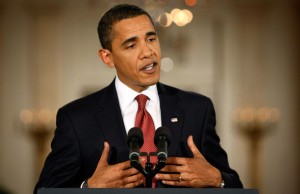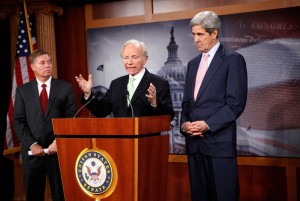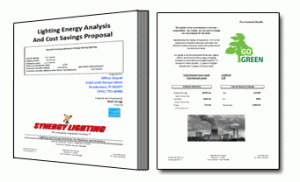 For years now environmentalists have been calling for the reduction of carbon footprints. Originally under political pressure from Al Gore, California passed aggressive energy laws, and now with the BP Gulf Crisis, these environmental changes are moving full speed ahead. In July of 2009, Congress Passed an amendment to the Energy Independence and Security Act of 2007. Under this amendment, commercial business among many other energy sectors were given a hard blow. This bill called for the elimination of many of the most commonly used light bulbs in commercial business, forcing business owners to convert or make significant change by 2012. Now as we again approach July 2010, President Obama is to meet with Senior Senate Staff from both parties to discuss new legislature currently stalled in the Senate.
For years now environmentalists have been calling for the reduction of carbon footprints. Originally under political pressure from Al Gore, California passed aggressive energy laws, and now with the BP Gulf Crisis, these environmental changes are moving full speed ahead. In July of 2009, Congress Passed an amendment to the Energy Independence and Security Act of 2007. Under this amendment, commercial business among many other energy sectors were given a hard blow. This bill called for the elimination of many of the most commonly used light bulbs in commercial business, forcing business owners to convert or make significant change by 2012. Now as we again approach July 2010, President Obama is to meet with Senior Senate Staff from both parties to discuss new legislature currently stalled in the Senate.
 The current administration has demonstrated a strong drive for climate changes and futures in clean energy despite it’s immediate impact to business owners. In general these new legislations are for the good for the much debated global warming and our countries economy, but they will not come without a financial toll to large corporations and small business owners.
The current administration has demonstrated a strong drive for climate changes and futures in clean energy despite it’s immediate impact to business owners. In general these new legislations are for the good for the much debated global warming and our countries economy, but they will not come without a financial toll to large corporations and small business owners.
Under the proposed Carbon Tax by Rep. Larson, a member of the powerful, tax-writing Ways & Means Committee, appears to have crafted his new bill to counter most if not all salient objections to carbon taxing, and at the same time Kerry and Leiberman are pushing for the new energy bill to pass as it may damage our ability to compete in the alternative energy sector.
What the Carbon Tax will mean for business:
- The first-year tax rate is $15 per ton of carbon dioxide, then the rate rises by $10/ton per year.
- After five years, that increase rate is automatically bumped up to $15/ton if U.S. emissions stray from an EPA-certified glide path to cut emissions by 80% from 2005 levels in 2050.
- To protect domestic manufacturers, the bill authorizes the Treasury Department to impose a “carbon equivalency fee” on carbon-intensive products imported from non-carbon-taxing nations.
How can a business prepare for the passing of a Carbon Tax?
Kerry and Lieberman unveiled the Senate bill last month which would require U.S. industries and utilities to cut their output of carbon dioxide pollution, which many scientists blame for global warming. Currently the majority of usage from a business is the consumption of electricity by lighting. Whether the proposed tax is placed on producers or consumers, American business will feel the pinch either way because of our usage of electricity from coal producing power plants.
If a business large or small follows the existing ammendment to the Energy Independance & Security Act, that business can successfully reduce its carbon consumption by several tons depending on the type of lighting being used. In light of the potential carbon tax, a business must provide documentation that it has reduced its carbon footprint to avoid these financial burdens that will follow.
 Synergy Lighting which has been a leader in South Florida, and held a dedication to reducing energy costs and the environmental impacts from lighting usage, is prepared to face this challenge for its clients. Synergy Lighting provides a full facility Feasibility Study and Environmental Impact Study as part of its energy reduction campaign. In this study, which meets Energy Star and ASHREA Standards, our clients are provided full documentation to provide to the US Government their efforts to reduce the overall carbon foot print of that business which provides the required documentation for a Carbon Tax under proposed law.
Synergy Lighting which has been a leader in South Florida, and held a dedication to reducing energy costs and the environmental impacts from lighting usage, is prepared to face this challenge for its clients. Synergy Lighting provides a full facility Feasibility Study and Environmental Impact Study as part of its energy reduction campaign. In this study, which meets Energy Star and ASHREA Standards, our clients are provided full documentation to provide to the US Government their efforts to reduce the overall carbon foot print of that business which provides the required documentation for a Carbon Tax under proposed law.
The Feasability and Environmental Impact Study is provided to current and potential clients of Synergy Lighting at no charge as part of our commitment to energy eficiency and our dedication to a cleaner environment. For more information on a No Charge Feasibility Study, view our website or call Synergy Lighting for a free consultation.
Phone: (941)-756-4844
Toll Free: (877) 220-5483
e-mail: sales@synergylightingusa.com
![]()

